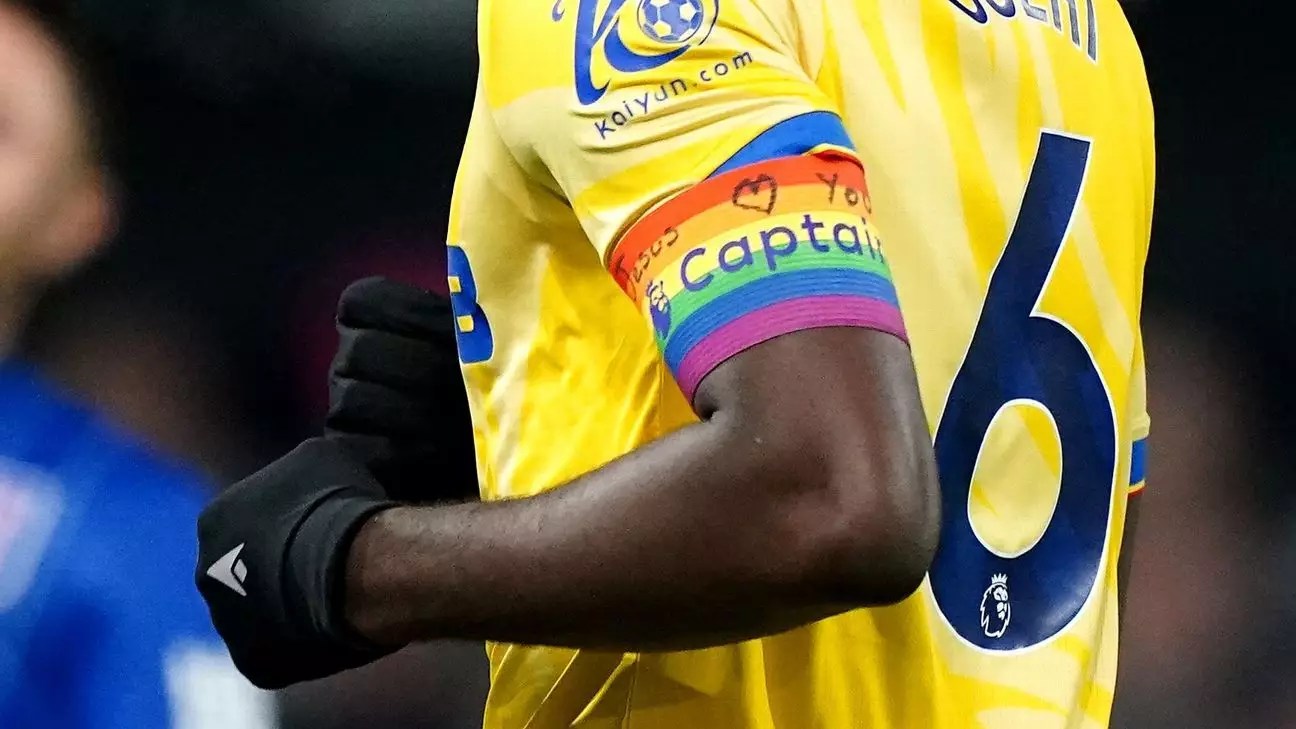In the ever-evolving landscape of modern football, the intersection of personal beliefs and institutional regulations often leads to both commendation and controversy. The recent incident involving Crystal Palace’s Marc Guéhi shines a spotlight on this delicate balance. Guéhi, in an act of personal expression, wrote “Jesus loves you” on a rainbow-coloured captain’s armband during a match against Ipswich Town, an incident that has stirred significant conversation regarding kit regulations and the implications of personal messages in professional sports.
Guéhi’s actions did not occur in a vacuum. The Football Association (FA) had already issued warnings regarding the strict adherence to kit regulations, which unequivocally prohibit any religious messages or slogans. However, the context of his message cannot be overlooked. For Guéhi, a devout Christian, the phrase he opted to display was about expressing his faith, albeit at a time when the rainbow armbands were designated to support LGBTQ+ rights through Stonewall’s Rainbow Laces campaign. This duality of intent raises complex questions: Can such expressions coexist without conflict? Is there an inherent tension between personal faith and communal inclusivity?
The FA’s position on this matter is grounded in a modification to the Laws of the Game that stresses the necessity for captains to wear armbands that conform to clearly defined standards. These regulations aim to foster a unified message during matches, promoting equality and respect across diverse backgrounds. Despite these established guidelines, Guéhi’s actions provoke a nuanced discussion about the intent behind these regulations. Are they merely rules, or do they reflect deeper societal values? The FA’s reminder to Guéhi, rather than punitive measures, may indicate an acknowledgment of the complex nature of personal beliefs versus collective representation.
Reactions to Guéhi’s action were mixed. Crystal Palace manager Oliver Glasner defended Guéhi’s right to express his beliefs, suggesting that football is fundamentally about respect and understanding for diverse perspectives. This notion resonates with a broader movement within the sport towards inclusivity, emphasizing empathy rather than division. However, Sam Morsy, Ipswich’s midfielder and a practicing Muslim, chose not to wear the armband, highlighting that individual beliefs can lead to differing expressions of support. The FA seems to recognize Morsy’s autonomy in this matter, a stance that could be perceived as inconsistent with the repercussions faced by Guéhi.
The juxtaposition of Guéhi’s religious expression against the backdrop of LGBTQ+ inclusivity raises significant moral and philosophical dilemmas. On one hand, the desire for inclusivity in sports seeks to create an environment where all individuals feel accepted and valued. On the other, personal beliefs, such as those held by Guéhi, reflect deeply ingrained values that also demand respect. This situation underscores a crucial question in contemporary society: How can we foster an atmosphere of acceptance for all beliefs while not infringing on the rights of individuals to express their convictions?
In the end, the incident involving Marc Guéhi serves as a microcosm of a larger societal dialogue regarding faith, inclusion, and expression in sports. It presents an opportunity for the football community—and society at large—to engage in deeper conversations about respect for personal beliefs while championing the values of inclusivity and diversity. Perhaps, the solution lies not in strict regulations but in fostering environments that embrace dialogue, allowing individuals to share their perspectives while collectively working towards a culture that celebrates both faith and acceptance. As football continues to evolve, so too must the discussions that underpin the sport, paving the way for a more understanding and integrated future.


Leave a Reply